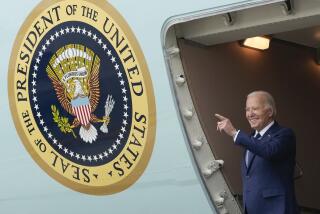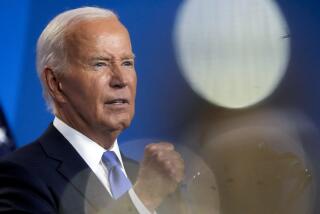Primary Responsibility
- Share via
Republicans have taken a critical step toward bringing some order and common sense to the crazy-quilt presidential primary system that gave us both major party candidates in just six weeks this past winter. A commission proposed by former GOP Chairman Bill Brock would set four major primary dates for the next presidential election year--the first Tuesdays of March, April, May and June. Roughly one-fourth of the states would hold their primary elections on those dates.
This would put a stop to the current lemming-like rush of the primaries, which was precipitated by California’s move from its traditional June voting back to March. The earlier primaries were aimed at gaining maximum influence on the selection of the presidential candidates. California had smarted for decades with its late and largely irrelevant June primary, which usually occurred long after the party nominees had been decided by early primaries in other states.
The Brock Commission proposal is similar to one advanced last year by chief elections officers of the 50 states, including California Secretary of State Bill Jones. But there is a major flaw with the Brock plan. It proposes that states would hold their primaries on each of the four Tuesdays, with the least-populated states going first, in March, followed by other groupings higher on the population scale. The big states, including California, Texas and New York, would vote last, in June.
But this proposal would impose a nightmare travel burden on the candidates as they roamed the first month from Maine to Wyoming and Rhode Island to North Dakota to shake hands with very few voters. In effect, each month would mean another nationwide primary.
The elections officers’ plan is far better. The order would be rotated every four years so that each region has a chance to go first. Travel would be focused on a single area each month. Common regional issues could be addressed.
The willingness of the Brock Commission to propose a clean break from the present front-loading of primaries is encouraging. So too is its recommendation that the Republican National Convention in Philadelphia in July give the Republican National Committee authority to alter the primary schedule between now and 2004. Only the convention itself can make such a change now. This would give the GOP time to work with Democrats on common election days. Any changes still would have to be approved by each state’s Legislature.
Well-heeled front-runners may like the current schedule, which allows them to get a lock on their parties’ nominations by early March. But it is an absurd, chaotic system that denies millions of American voters the chance to participate in elections and that fails to put candidates to a sustained test on issues and character.
More to Read
Get the L.A. Times Politics newsletter
Deeply reported insights into legislation, politics and policy from Sacramento, Washington and beyond. In your inbox twice per week.
You may occasionally receive promotional content from the Los Angeles Times.







